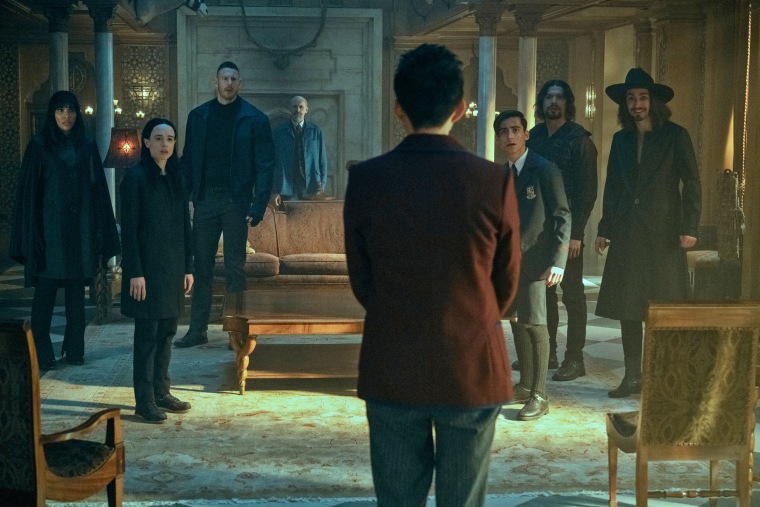Netflix’s current biggest in-house superhero franchise, “The Umbrella Academy,” was a breath of fresh air when it arrived on the heels of Netflix mass-canceling its Marvel series. It also challenged the notion that being born with superpowers would inherently be a good thing in today’s society, and not a source of massive childhood trauma.
Of all the superhero franchises Netflix has attempted to launch, “The Umbrella Academy” is easily its biggest hit.
Three seasons in, the series is trying to do too much, and some of the show’s best moments are the ones it never saw coming. The overall effect is of a season that sticks the landing because of good luck (and the real-life story of one very courageous star), not unlike the way its titular group of superheroes usually end up saving the world.
Of all the superhero franchises Netflix has attempted to launch, “The Umbrella Academy” is easily its biggest hit. Most only lasted a season (“Jupiter’s Legacy,” anyone?) or have flown under the radar, like “Locke & Key.” It is also one of the few (if not the only) of Netflix’s superhero franchise legitimately able to challenge Marvel’s supremacy, at least more than certain DC films can claim. And that’s because it takes all the good things about comic books — the colorfulness, the playfulness — and adds the one thing that Disney cannot abide: chaos.
Since its first season, “The Umbrella Academy” has thrived on chaotic storylines, throwing around time traveling tales and multiverses like ping pong balls, and delighting in whichever way they landed. Season Three triples down on the trope, taking the seven Umbrella members and sending them home to the wrong timeline, one where they’ve not only been replaced with seven other superpowered people (now working under “The Sparrow Academy”) but where they were never actually born in the first place.
This causes a paradox, the kind that doesn’t just end life on Earth, but the entire universe. In response, the show cheerfully delves into concepts like “The Grandfather Paradox” and “Kugelblitz” — types of time-travel terms hardcore science fiction nerds would easily grasp, but which Marvel avoids. Even when Marvel has attempted time travel and multiverses, it keeps things as straightforward as possible for fear of mainstream audiences becoming confused and tuning out. However, “The Umbrella Academy” assumes a level of intelligence from its audience and trusts fans to follow the show wherever it goes (including to Oblivion, which is a real place, and has a roach problem).

But as ambitious as “The Umbrella Academy” is, this season isn’t without problems. Doubling the number of traumatized superheroes makes for an unwieldy cast in the first few episodes, at least until some of the guest stars find themselves offed in creative ways. Too many characters creates too many plotlines, and the stronger ones aren’t given enough screen time. (And yet, the weaker ones are given too much time in a season that feels about two hours too long.)
But within the chaotic mess, there are some genuinely great performances. David Castañeda and Ritu Arya are fantastic as Diego and Lila trying to balance a relationship, parenthood and time travel, all while skirting apocalypses at regular intervals. (Special mention to “Euphoria’s” Javon Walton as their son, Stan.) Emmy Raver-Lampman also brings her A-game as Allison, the superhero with the most mainstream life, who has to deal with everything she loves getting ripped away every time the timeline changes. Also, Justin H. Min shines as the newly no-longer-dead Ben; freed from existing only as a ghost a few people can see, Min tears up the screen as his new timeline’s much crueler counterpart.
But the real heart of this season isn’t about how families handle changing timelines and universes, but the way they handle their siblings’ emotional self-discoveries. Early into filming the new season, the series’ biggest star, Elliot Page, came out as transgender. The series decided his character Vanya should follow suit. Viktor Hargreeves’ coming out is one of the best-handled storylines of the season, and provides a masterful “how to” guide in handling a transitioning family member.
Even if not everything works in Season Three, the series’ nailing Viktor’s journey is enough to make it worth the watch. It may be an accident of fate that “The Umbrella Academy’s” best plotline came from something the universe threw at it. But that’s just art imitating life and vice versa — nothing ever goes as planned in the world of “The Umbrella Academy.” But sometimes spontaneity (and even mess) is exactly what the universe ordered, and the show continues to thrive on it.
Source: | This article originally belongs to Nbcnews.com










